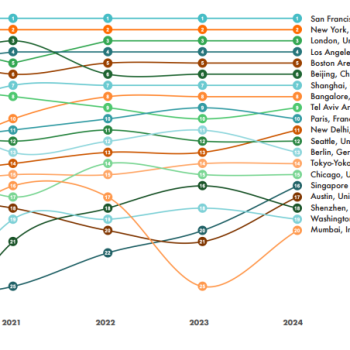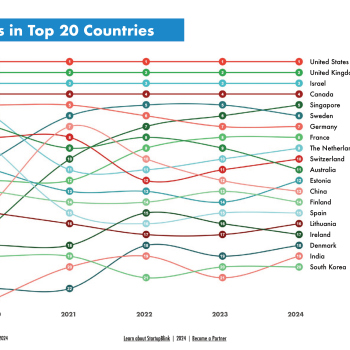Africa is an often underestimated and overlooked region when it comes to mega hubs for Innovation, compared to the USA and Europe. And yet, the continent has some of the fastest-growing and seriously innovative ecosystems in the world. In this article, we will present a guide to the Best Startup Cities in Africa.
- Nairobi, Kenya
- Lagos, Nigeria
- Cape Town, South Africa
- Johannesburg, South Africa
- Cairo, Egypt
- Kigali, Rwanda
- Tunis, Tunisisa
- Kampala, Uganda
- Accra, Ghana
- Casablanca, Morrocco
To determine which cities should be included in the list, we used the newest Global Startup Ecosystem Rankings Report by StartupBlink that analyzes startup ecosystems in 1,000 cities and 100 countries.
The 10 Best Startup Cities in Africa
Based on the report, results for Africa are mixed. No country has made it to the top 50 in 2020. However, there are 11 African countries in the top 100 list – Featuring for the first time, Cape Verde and Somalia
1. Nairobi, Kenya
A growing and diversifying ecosystem, Nairobi represents Africa as the leading Startup ecosystem on the continent. Often referred to as Silicon Savannah (A play on Silicon Valley and the landscape of Kenya) the city boasts a booming tech scene on the back of the success of M-Pesa, while organizations like Konzo Techno City and Metta support and promote the city’s entrepreneurship spirit.
2. Lagos, Nigeria
While Nigeria started to form its ecosystem later Kenya or South Africa, Nigeria has accelerated quickly and Lagos has taken its place as the 2nd strongest hub for innovation on the continent. While the success of the country’s first Unicorn Jumia has taken a downturn, the Nigerian ecosystem has seen innovative Startups such as Kobo360 & Mdundo emerge to take the ecosystem forward.
3. Cape Town, South Africa
At No. 3 stands Cape Town, the legislative capital of South Africa. South Africa fits among the most affluent countries on the continent. While an important hub for financial services, retail, and tourism, the country and the city face a lot of challenges due to rooted class division and big corporation dominance. Cape Town, leads the country in innovation with a reel of startup success stories from payment app Yoco and travel start-up TravelStart
4. Johannesburg, South Africa
Johannesburg has seen a huge jump in its ecosystem since 2019, building on the country’s wave of entrepreneurship that has found solutions to tackle local and regional problems. There are a couple of hundred programs supporting startup activities in the city, and a huge fintech sector, with over 30% of startups operating in the financial sector.
5. Cairo, Egypt
Ranking at 5th is Cairo, the heart of Egypt. Local and foreign financial support in the country has opened several opportunities to take entrepreneurship to the next level in recent years and Cairo has benefitted significantly as the nation’s capital. Its low cost of living and immense history makes it an attractive location for young entrepreneurs.
6. Kigali, Rwanda
At 6th there is the truly robust startup ecosystem of Kigali, representing the nation of Rwanda. With the help of the African Development Bank, the influx of tech companies, investors and tailored government support and private sector engagement, economic innovation has received a substantial boost in Rwanda. Despite some infrastructural challenges, Kigali has great connectivity and stable electricity that facilitates the path of startup founders.
7. Tunis, Tunisia
7th on the list in Tunis, the capital of Tunisia and port city on a large Mediterranean Sea gulf. Just like other coastal cities, the regional economy benefits greatly from the tourism sector. Additionally, the Tunisian government is starting to notice the importance of creating startup hubs and has passed a Startup Act that encourages startup growth by easing tax policies, providing government-sanctioned salary to founders, and helping startups get international patents.
8. Kampala, Uganda
Representing Uganda, Kampala is the 8th best-ranked startup ecosystem on the African continent. Kampala’s startup ecosystem players actively engage in startup ecosystem building due to events and activities organized by the Innovation Village, Startup Uganda, and various coworking spaces. Both founders and organizations are working for hand in had to tackle some of the local challenges and promote entrepreneurship.
9. Accra, Ghana
At 9th is Accra, the capital of Ghana. The city – in a similar fashion to the country as a whole, has seen some major improvements. That includes, receiving direct foreign investment from various organizations like the Ghana Startup capital fund, the Ghana-India Kof Annan Centre of Excellence in ICT, and 3 Day Startup. These programs confirm that entrepreneurship is spreading not only in the capital city bus across the country as well. This country is well known for mobile payment apps and it is home to some of the startup successes like Meqasa, Omgdigital, and Expresspay.
10. Casablanca, Morocco
Ranked at 10th on the continent, Casablanca is a Morrocco’s leading startup hub. This city is also a port city and commercial hub in western Morocco, fronting the Atlantic Ocean. Casablanca, unlike other locations in Morocco, has several coworking spaces to choose from. Other than that, there are organizations and local startups that work hard to connect ecosystem players and encourage idea-sharing for a culture of collaborative innovation.
Young and exciting startup ecosystems
Many African countries face unique political and infrastructural challenges. While that hinders the growth of the region in many ways it also forces its entrepreneurs to be particularly innovative in creating solutions around its problems. With the implementation of the African Continental Free Trade Area and a young increasingly technical population, Africa’s countries are likely to benefit in the next decade.
Are you an ecosystem builder and want to let us know about your ecosystem? Take a look at our Ecosystem Partnership.
Want to know more about the Best Startup Cities in Africa? StartupBlink PRO Members get access to a variety of analysis tools and the raw data of the ranking algorithm that allows them to dig deeper into startup ecosystem analysis.







